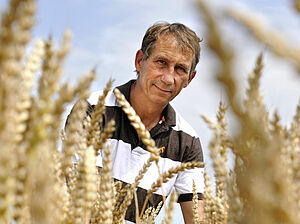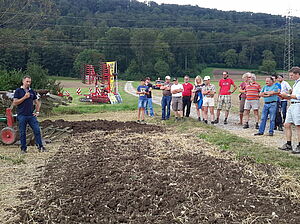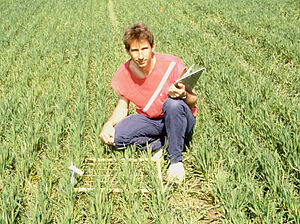"The KABB were a quantum leap"
50th anniversary voices
Hansueli Dierauer has – with a brief interruption – been working at FiBL since 1988, mainly as an advisor, focused on arable farming. The magazine "Die Grüne" once called him "Mister Arable Farming at FiBL". From 2002 to 2010 he headed the FiBL advisory service, and from 2002 to 2022 the Cultivation Technique Arable Crops Group.
You started working at FiBL in Oberwil in the canton Basel-Landschaft in 1988. What was your task?
I took on a project to improve mechanical weed control. We investigated in wheat how different row spacings and the harrow alone and in combination with coulters affect soil cover and yield. FiBL's core business was the DOK trial, which had been running since 1978. However, I never worked in the DOK long-term trial.
What was it like at FiBL back then?
The ~20 FiBL employees were accommodated in an old villa on the Bernhardsberg in Oberwil in Baselland. The DOK trial is located at the foot of the Bernhardsberg. At that time, there was only research focusing on plant cultivation and advisory services. In 1993 there was a financial bottleneck. Of all things, when Coop became a licensee of the Knospe (label of Bio Suisse, the umbrella organisation of Swiss organic farmers, editor's note), the upswing in organic farming began. I went into the private sector for four years and returned to FiBL when it had just moved to Frick in the canton Aargau.
And then, in which function?
As an organic advisor for northwestern Switzerland, I advised mainly in organic conversion and within a nitrate project. The start in Frick was with about 60 people. As it grew, there were different groups with three to ten employees, for example, on vegetable production, fruit production, plant protection, soil, animals, economics and international extension. During the first ten years in Frick, I increasingly specialised in different areas of arable farming.
Since 2008, the arable farming group has grown to 12 people. Is this because arable farming has become more important in organic farming?
In recent times, certainly. But the main reason was that the FOAG (Federal Office for Agriculture, editor's note) wanted to avoid duplication in research, especially in arable farming, where Agroscope is strong. So FiBL concentrated on fruit, wine, vegetables, and animal husbandry. In arable farming, we expanded our advisory services and started with simple, practical trials that did not particularly interest researchers. In addition to this, Bio Suisse introduced the KABB (Knospe-Ackerbaubeiträge, editor's note), the special-purpose Knospe arable premiums. That was a quantum leap for us.
Is that one reason for the close cooperation between FiBL and Bio Suisse in arable farming?
Yes, definitely. We were able to submit projects to Bio Suisse. We built a nationwide network for on-farm variety trials, starting with wheat. Then Bio Suisse helped with the trial network for potatoes.
Who decides what should be researched?
The expert group of Bio Suisse sets priorities every year. The market is also represented. So the expert group knows which crops are in demand and where there are cultivation problems. For example, the shortage of organic sugar beet is well known. FiBL can help to develop the crop, and we are working on research projects to solve the cultivation problems.
What are the milestones in Swiss organic arable farming?
1993 was a key year with Coop's entry into the organic business. Until then, there was hardly any market for organic arable crops. Shortly afterwards, Migros also demanded organic products. The number of organic farms grew accordingly. The next milestone was in 1997 when the first Organic Farming Ordinance protected the concept of organic farming. There were now organic contributions via direct payments. The DOK trial, for example, served as the basis for this.
Are there other arable milestones?
The "Journée de réflexion grandes cultures" in 2004, with all the important players in organic farming, was decisive. We began to develop programmes on which crops should be promoted and how. It triggered many organic conversions, especially in French-speaking Switzerland. In 2012, together with Sativa Rheinau and Bio Suisse, we held the first Organic Arable Farming Day, and in the meantime, it has already taken place eight times.
What is the most important thing to you about working at FiBL?
The involvement of farmers in research is a matter close to my heart. I have also never been too shy to do practical work myself. I feel guilty when I get the impression that research is removed from the realities on the field. We can learn an enormous amount from farmers and their practices. The innovations mostly come from there rather than from research. We welcome, accompany, assess and classify these ideas as best we can.
What is your wish for FiBL in the future?
My wish for FiBL is that it takes care of practice-oriented research and can continue to expand the practice trial networks in Switzerland. Here I see a risk of becoming more distanced with the increasing size of the institute. Trial networks also need to be maintained and new ideas fed in. FiBL can also help find solutions to climate change and the associated increase in pests. Innovations in cultivation techniques should remain more important than calculating life cycle assessments. In addition, I would, of course, like to see extension services strengthened further.
Interview: Stephanie Fuchs
This is a shortened and slightly adapted version of an interview that appeared in the Bioaktuell magazine 2/23. Long versions of the interview in German, French and Italian are available online.
Further information
Download
- Interview "Die KABB waren ein Quantensprung" published in Bioaktuell magazine 2/23 (in German) (162.1 KB)
- Long version of the interview "Die KABB waren ein Quantensprung" (in German) (556.2 KB)
- Interview "Les CGCB étaient un saut quantique" published in Bioactualités magazine 2/23 (in French) (166.9 KB)
- Interview "Con i CCG si è fatto un salto di qualità" published in Bioattualità magazine 2/23 (in Italian) (134.2 KB)






